Project Description
Principles of Fuzzy Logic and its Application
July 13–17, 2020
3 ECTS
Samuel Morillas
Prerequisites
Bachelor’s or Master’s degree
Good background in mathematical analysis and algebra (graduate in engineering or science level)
Medium programming skills (basic MatLab knowledge recommended)
B2 English level
About the course
The concept of Fuzzy Sets was introduced by Lofti A. Zadeh (University of California at Berkeley) in 1965. From here and during more than 50 years the theory of Fuzzy Logic has been in constant evolution and development. Besides, it has been applied to a wide range of problems in almost all branches of science and engineering. Fuzzy Logic theory has been proven especially appropriate for problems including uncertainty or subjectivity, highly nonlinearity and/or human knowledge. These points make Fuzzy Logic to be interesting to both colour science and imaging paradigms. Fuzzy logic is one of the many artificial intelligence paradigms. Initially, the fuzzy theory appeared as a mathematical extension of the classical setting to allow partial and continuous membership of elements to the so-called fuzzy sets. Then, it extended the classical logic to allow partial certainty of statements and approximate reasoning. In the last years, fuzzy logic has been used to solve problems in almost all branches of science and engineering. It has been proven to be a universal approximator and a good approach to emulate human reasoning. In general, it can be used to solve any problem when structured knowledge is available.
Aims of the course
The aim of the course is to provide the fundamentals of fuzzy logic from theory to practice as well as to analyse some practical problems that could be solved with a fuzzy approach. The course has a very applied nature. Students will work on the development and implementation of fuzzy logic-based systems for practical applications on a daily basis so that the theoretical concepts are better understood and the practical point of view is always in mind. Finally, a set of different problems will be suggested for the students to develop and student performance will be assessed through the development, implementation, and presentation of a personal application project.
Why should you attend this course?
One of the main goals in the education of engineers and computer scientists as well as data scientists is to provide them with both theoretical knowledge and practical tools that can be applied to solve problems. This course will provide the students with both theoretical knowledge as well as application methodologies to be able to design fuzzy logic systems and apply them to solve practical problems.
After the course, you will:
- know the fundamentals of fuzzy sets and fuzzy logic including concepts related to fuzzy numbers and approximate reasoning,
- be familiar with the methodology to follow when designing and applying fuzzy logic systems,
- be able to structure knowledge in terms of implications IF-THEN rules that a fuzzy logic system can use to generate output information from input data,
- apply the so-called fuzzyfication procedure to transform real data into fuzzy data to be used in the approximate reasoning,
- apply the so-called defuzzyfication procedures to transform fuzzy results of reasoning into real/crisp data in the form needed for the particular application.







